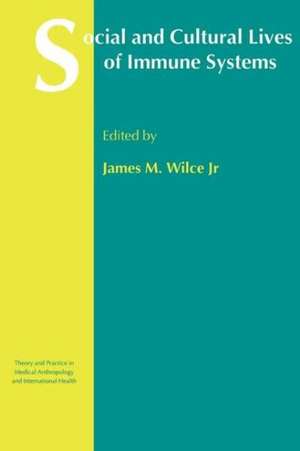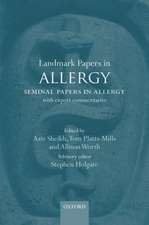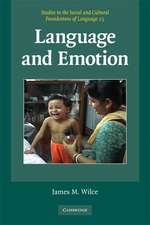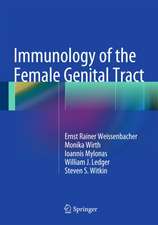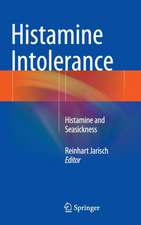Social and Cultural Lives of Immune Systems: Theory and Practice in Medical Anthropology
Editat de James M. Wilce Jr.en Limba Engleză Paperback – 3 apr 2003
| Toate formatele și edițiile | Preț | Express |
|---|---|---|
| Paperback (1) | 466.70 lei 6-8 săpt. | |
| Taylor & Francis – 3 apr 2003 | 466.70 lei 6-8 săpt. | |
| Hardback (1) | 1006.60 lei 6-8 săpt. | |
| Taylor & Francis – 10 apr 2003 | 1006.60 lei 6-8 săpt. |
Preț: 466.70 lei
Preț vechi: 549.07 lei
-15% Nou
Puncte Express: 700
Preț estimativ în valută:
89.31€ • 96.98$ • 75.02£
89.31€ • 96.98$ • 75.02£
Carte tipărită la comandă
Livrare economică 22 aprilie-06 mai
Preluare comenzi: 021 569.72.76
Specificații
ISBN-13: 9780415310055
ISBN-10: 0415310059
Pagini: 328
Ilustrații: 1
Dimensiuni: 156 x 234 x 19 mm
Greutate: 0.61 kg
Ediția:1
Editura: Taylor & Francis
Colecția Routledge
Seria Theory and Practice in Medical Anthropology
Locul publicării:Oxford, United Kingdom
ISBN-10: 0415310059
Pagini: 328
Ilustrații: 1
Dimensiuni: 156 x 234 x 19 mm
Greutate: 0.61 kg
Ediția:1
Editura: Taylor & Francis
Colecția Routledge
Seria Theory and Practice in Medical Anthropology
Locul publicării:Oxford, United Kingdom
Public țintă
Postgraduate and UndergraduateCuprins
Introduction: Social and Cultural Lives of Immune Systems in a Semiotic Universe PART 1: THEORETICAL PERSPECTIVES 2. Telling Stories: The health Benefits of Disclosure 3. Relating to Our Worlds in a Psychbiological Context: The Impact of Disclosure on Self-Generation and Immunity 4. Metaphors Our Bodyminds Live By 5. 'Immune' to Emotion: The Relative Absence of Emotion in PNI, and Its Centrality to Everything Else PART 2: PNI IN THE WILD: ANTHROPOLOGICAL FIELDWORK USING ENDOCRINE AND IMMUNE VARIABLES 6. Childhood Street: Endocrine and Immune Responses to Psychosocial Events 7. Cultural Congruity and the Cortisol Street Response among Dominican Men 8. Life Event Stress and Immune Function in Samoan Adolescents: Toward a Cross-Cultural Psychoneuroimmunology PART 3: CIVILIZATION AND ITS STRESSED DISCONTENTS: FROM INDIVIDUAL STRESS TO CROSS-NATIONAL COMPARISONS 9. The Enigma of Hypertension and Psychosomatic Illness: Lessons for Psychoneuroimmunology From Beyond the Conscious Mind 10. Cultural Variations in the Placebo effect: Ulcers, Anxiety and Blood Pressure 11. Corporeal Flows: The Immune System and the Political Economy of Food PART 4: CRITICAL RETROSPECTIVES 12. Stressful Encounters of an Immunological Kind: The Social Dimensions of Psychoneuroimmunology 13. Reflections on Embodiment
Notă biografică
Jim Wilce has been Assistant Professor of Anthropology at Northern Arizona University since 1994. His anthropology graduate studies, fieldwork, and his first book - Eloquence in Trouble: Poetics and Politics of Complaining in Bangladesh - combined his lifelong interests in language, illness, and healing. He has been working to develop a sociocultural perspective on psychoneuroimmunology and its role in symbolic healingsince 1990. His article on language and healing has appeared in Journal of Linguistic Anthropology (1999) and has been reprinted twice, and his work in psychiatric anthropology has appeared in Cultural Anthropology, and the forthcoming volume, The edge of Experience: Culture, Subjectivity, and Schizophrenia (Cambridge University Press, 2003).
Wilce lived in Bangledesh for five years in the 1980s and 1990s. He did fieldwork in the Chandpur and Comilla Districts, focusing on suffering and its discursive expressions in domestic and medical settings. He has focused particular attention on spontaneously improvised laments once heard commonly in Bangladesh and around the world. His article on lament appeared in Comparative Studies in Society and History (2001) and his new book on this topic, Crying Shame, should appear in 2005.
Wilce lived in Bangledesh for five years in the 1980s and 1990s. He did fieldwork in the Chandpur and Comilla Districts, focusing on suffering and its discursive expressions in domestic and medical settings. He has focused particular attention on spontaneously improvised laments once heard commonly in Bangladesh and around the world. His article on lament appeared in Comparative Studies in Society and History (2001) and his new book on this topic, Crying Shame, should appear in 2005.
Descriere
This book introduces a provocative new branch of social theory: the hypothesis that immunity and disease are in part socially constituted. It suggests that immune systems function not only as material entities but also as social symbols.
